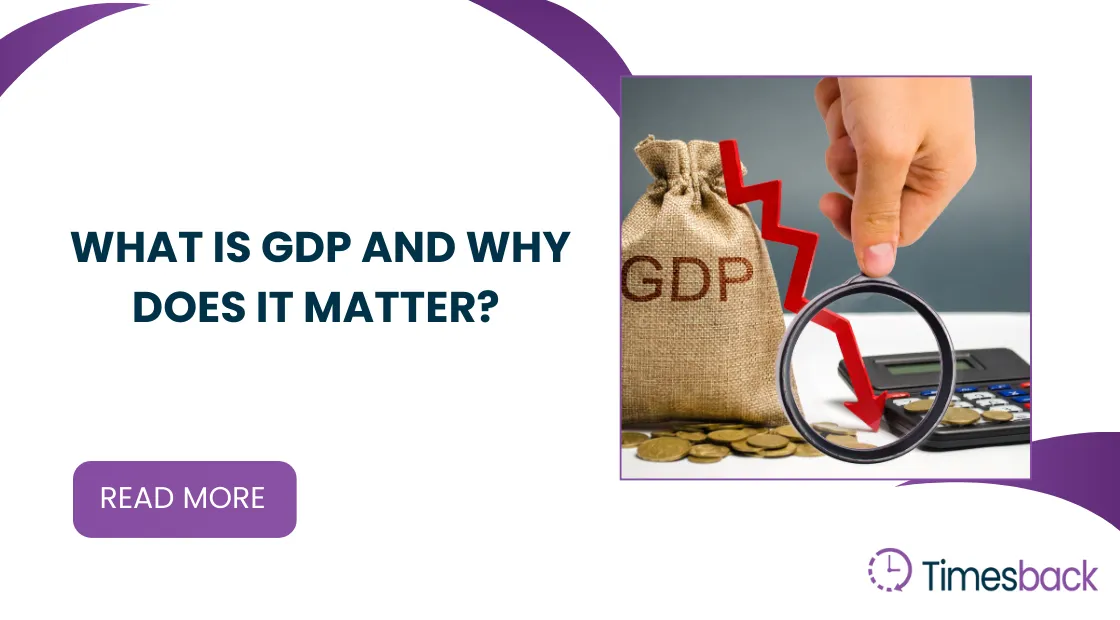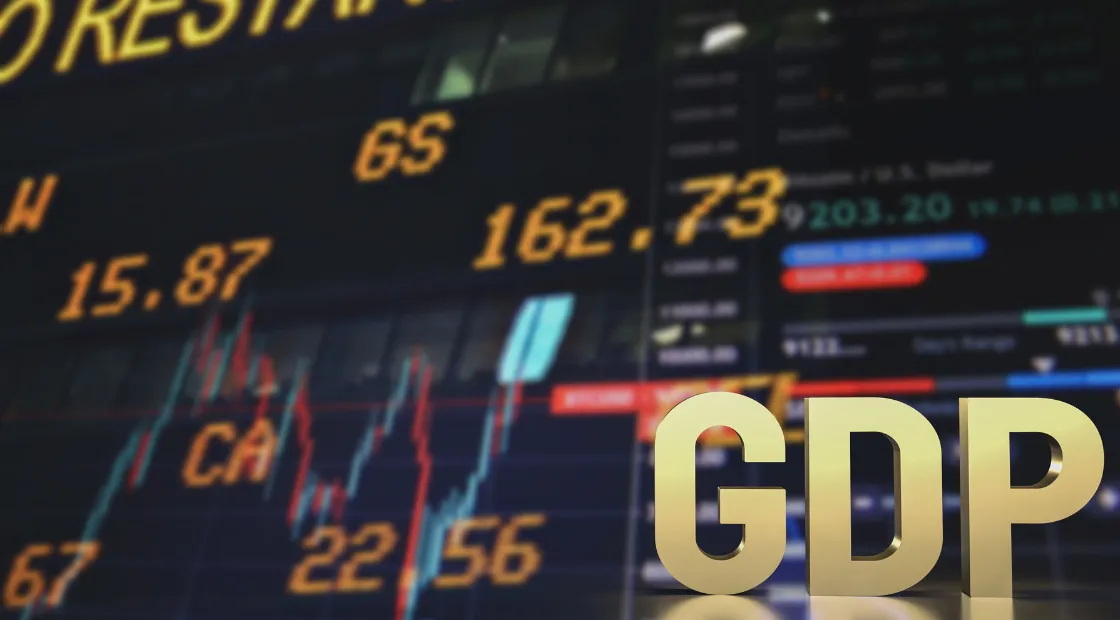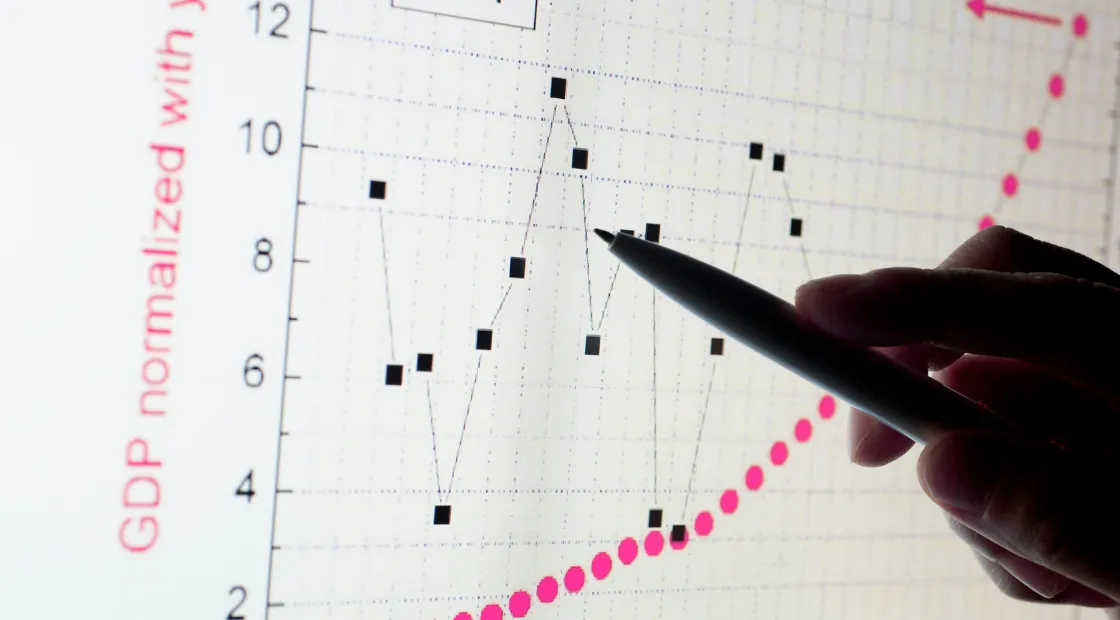Wat is het bbp en waarom is het belangrijk?

Wat is het bbp en waarom is het belangrijk? In essentie vertegenwoordigt het bruto binnenlands product (bbp) de totale monetaire waarde van alle goederen en diensten die binnen de grenzen van een land gedurende een bepaalde periode worden geproduceerd.
Anúncios
Het is een momentopname van de economische gezondheid, een cijfer dat beleidsmakers, investeerders en burgers nauwlettend in de gaten houden om de welvaart te beoordelen of om te waarschuwen voor problemen.
Maar het bbp is meer dan een statistiek; het is een verhaal over menselijke inspanning, innovatie en soms ook over systemische tekortkomingen.
Waarom heeft het zo'n grote invloed? Omdat het beslissingen beïnvloedt die doorwerken in markten, overheden en het levensonderhoud van mensen.
Anúncios
Dit artikel ontrafelt de mechanismen van het bbp, de betekenis ervan en de beperkingen, en biedt een nieuw perspectief op waarom deze indicator in 2025 van belang is.
De anatomie van het bbp: meer dan alleen cijfers
Stel je het bbp voor als de hartslag van een economie, die klopt bij elke transactie, van een barista die koffie zet tot een techgigant die een nieuwe gadget lanceert.
Het wordt op drie manieren berekend: productie (wat er gemaakt wordt), inkomen (wat er verdiend wordt) of uitgaven (wat er uitgegeven wordt).
Elke methode zou in theorie hetzelfde resultaat moeten opleveren, wat de onderlinge verbondenheid van de economie weerspiegelt.
De meest gebruikte uitgavenmethode telt de consumentenbestedingen, bedrijfsinvesteringen, overheidsuitgaven en netto-export (export min import) bij elkaar op.
In 2024 bereikte het Amerikaanse bbp $27,36 biljoen dollar, een cijfer dat de meeste landen ver overtreft, maar zonder context weinig zegt.
Waarom is deze berekening belangrijk?
Het is een universele maatstaf.
Overheden gebruiken het bbp om begrotingen vast te stellen, centrale banken om de rentetarieven aan te passen en bedrijven om expansiestrategieën te plannen.
De eenvoud ervan kan echter misleidend zijn.
Het bbp maakt geen onderscheid tussen een dollar die aan gezondheidszorg wordt besteed en een dollar die aan fastfood wordt uitgegeven; ze worden als gelijkwaardig beschouwd.
Deze blinde vlek leidt tot discussie: meet het bbp wel echt wat er toe doet?
Bovendien kunnen bbp-cijfers worden beïnvloed door externe factoren, zoals wereldwijde markttrends of natuurrampen.
Een stijging van het bbp als gevolg van hogere militaire uitgaven hoeft bijvoorbeeld niet per se de algehele maatschappelijke welvaart te weerspiegelen, wat vragen oproept over de werkelijke drijfveren van economische groei.
Waarom het bbp wereldwijde beslissingen stuurt
Wat is het bbp en waarom is het belangrijk? Voor beleidsmakers is het een kompas.
Een stijgend bbp duidt op groei, wat investeringen en het creëren van banen stimuleert.
Een krimpend bbp, zoals tijdens de pandemie van 2020, leidt tot paniek: de werkloosheid stijgt, de markten wankelen en er komen talloze stimuleringspakketten op de markt.
Toen het Amerikaanse bbp bijvoorbeeld in 2020 met 3,41 TP3 biljoen kromp, verlaagde de Federal Reserve de rente en maakte het Congres 1 TP4 biljoen aan steunmaatregelen vrij.
Deze maatregelen waren niet willekeurig; ze waren ingegeven door het bbp en hadden als doel de economische motor weer op gang te brengen.
Bedrijven zijn ook afhankelijk van het bbp.
Neem bijvoorbeeld Apex Widgets, een fictieve fabrikant uit het Midwesten.
Wanneer de prognoses voor de bbp-groei stijgen, voert Apex de productie op, neemt werknemers aan en investeert in nieuwe machines, anticiperend op de vraag.
Omgekeerd kan een daling van het bbp leiden tot ontslagen of vertraagde groei.
Deze wisselwerking tussen data en besluitvorming onderstreept de rol van het bbp als een belangrijke indicator, ook al is het niet onfeilbaar.
Bovendien houden internationale organisaties zoals het Internationaal Monetair Fonds (IMF) het bbp nauwlettend in de gaten om economische prognoses en aanbevelingen aan de lidstaten te kunnen doen.
Deze afhankelijkheid van het bbp kan een vicieuze cirkel creëren waarin landen groeicijfers boven sociaal welzijn stellen, wat mogelijk tot negatieve gevolgen kan leiden.
Tabel 1: Groeipercentages van het Amerikaanse bbp (2020-2024)
| Jaar | Groeipercentage van het BBP (%) | Belangrijkste gebeurtenis |
|---|---|---|
| 2020 | -3.4 | Covid-19-pandemie |
| 2021 | 5.9 | Herstel en stimulans |
| 2022 | 2.1 | Inflatiegolf |
| 2023 | 2.5 | Stabilisatie-inspanningen |
| 2024 | 2.8 | Technologie- en energieboom |
| Bron: Bureau of Economic Analysis, schattingen voor 2025 |
+ Hoe investeer je in jezelf? Het beste rendement dat je ooit zult behalen!
Het rimpeleffect van het bbp op de samenleving
Buiten directiekamers en overheidsgebouwen geeft het BBP vorm aan levens.
Een robuust bbp hangt vaak samen met hogere lonen, betere infrastructuur en een hogere levensstandaard.
In 2023 bleek uit een onderzoek van het Brookings Institution dat een stijging van het bbp per hoofd van de bevolking met 11 TP3T het mediane huishoudinkomen in ontwikkelde landen met 0,71 TP3T deed stijgen.
Dit is geen abstract begrip; het betekent dat gezinnen zich betere scholen, gezondheidszorg of vakanties kunnen veroorloven.
Maar de voordelen zijn niet voor iedereen weggelegd.
BBP-groei kan ongelijkheid maskeren.
Stel je een technologiecentrum aan de kust voor, Silicon Shores, waar het bbp de hoogte in schiet dankzij AI-startups.
Ingenieurs en CEO's floreren, maar barista's en leraren hebben het moeilijk door de stijgende huurprijzen.
Het bbp geeft deze kloof niet weer, noch houdt het rekening met onbetaald werk, zoals mantelzorg, of milieukosten.
Een land kan een recordhoog bbp behalen, terwijl de bossen verdwijnen of de werknemers uitgeput raken.
Is het niet de moeite waard om te vragen: wat meten we nu eigenlijk echt als we het bbp vieren?
Bovendien is de publieke opinie vaak nauw verbonden met de economische groei, wat van invloed is op verkiezingen en beleidsbeslissingen.
Wanneer de bbp-groei sterk is, kunnen burgers optimistisch zijn over de toekomst, maar recessies kunnen leiden tot angst en onrust, wat de emotionele impact van deze indicator benadrukt.

Het wereldtoneel: het bbp als machtsindicator.
Wat is bbp en waarom is het belangrijk? Op wereldniveau is het een scorebord.
Landen met een hoger bbp hebben invloed – denk aan de VS of China, waarvan de economieën die van kleinere landen ver overtreffen.
De ranglijst van het bbp bepaalt de diplomatieke invloed, de militaire budgetten en zelfs de culturele export.
In 2024 bereikte het BBP van China $18,3 biljoen, waarmee het weliswaar achterbleef bij de VS, maar wel een teken was van de opkomst ervan.
Kleinere economieën, zoals Denemarken met een omvang van 1 TP4 T0,4 biljoen, presteren bovengemiddeld door efficiëntie, niet door pure omvang.
Het bbp beïnvloedt ook de wereldwijde markten.
Beleggers trekken massaal naar landen met een hoge bbp-groei in de hoop op rendement.
Opkomende markten zoals India, met een groei van 71 TP3 biljoen in 2024, trekken miljarden aan buitenlands kapitaal aan.
Maar volatiliteit ligt op de loer: een te grote focus op het bbp kan beleggers blind maken voor risico's zoals schuldenbubbels of sociale onrust.
Het is een spel met hoge inzet, waarbij het BBP zowel de kaart als een fata morgana is.
Daarnaast zijn handelsakkoorden en internationale betrekkingen vaak afhankelijk van bbp-cijfers, die van invloed zijn op onderhandelingen en partnerschappen.
Landen kunnen hun economische macht inzetten om gunstige voorwaarden te verkrijgen, waarmee de onderlinge verbondenheid van bbp en internationale diplomatie wordt aangetoond.
Tabel 2: Top 5 economieën op basis van nominaal bbp (2024)
| Rang | Land | BBP (biljoenen USD) | Aandeel van het wereldwijde bbp (%) |
|---|---|---|---|
| 1 | Verenigde Staten | 27.36 | 24.8 |
| 2 | China | 18.32 | 16.6 |
| 3 | Japan | 4.21 | 3.8 |
| 4 | Duitsland | 4.18 | 3.8 |
| 5 | India | 3.57 | 3.2 |
| Bron: Internationaal Monetair Fonds, prognoses voor 2025 |
Een gedeeltelijk beeld
Ondanks zijn dominantie vertoont het BBP scheuren.
Het is net als een autodashboard dat de snelheid weergeeft, maar niet het brandstofniveau of de bandenslijtage.
Het laat aspecten als levenskwaliteit, milieugezondheid en ongelijkheid buiten beschouwing.
Een land zou bijvoorbeeld zijn bbp kunnen verhogen door overbevissing in zijn wateren, maar tegen welke prijs?
De Bhutaanse index voor bruto nationaal geluk, die welzijn boven rijkdom stelt, betwist de dominantie van het bbp.
Zelfs in de VS houden alternatieven zoals de Genuine Progress Indicator rekening met vervuiling en vrije tijd, waardoor een minder rooskleurig beeld ontstaat.
Technologie voegt complexiteit toe.
Digitale diensten, zoals gratis apps, dragen ondanks hun waarde weinig bij aan het bbp.
In 2025, wanneer AI de economieën hervormt, zal het bbp mogelijk moeite hebben om immateriële voordelen, zoals de tijdsbesparing door automatisering, te omvatten.
Critici pleiten voor een bredere maatstaf, een die winst afweegt tegen maatschappelijk doel.
Bovendien vormt de opkomst van de gig-economie een uitdaging voor traditionele bbp-metingen, omdat veel bijdragers mogelijk niet worden meegenomen in standaard economische gegevens.
Deze kloof kan leiden tot een onderschatting van de werkelijke economische activiteit en innovatie in moderne economieën.

In 2025: Navigeren door een veranderend landschap
Wat is het bbp en waarom is het belangrijk? In 2025 is het een leidraad in turbulente tijden.
Klimaatverandering, AI en geopolitieke verschuivingen herdefiniëren groei.
Het groene bbp, dat rekening houdt met milieukosten, wint aan populariteit.
De Europese inspanningen voor duurzaamheid zouden ertoe kunnen leiden dat landen zoals Duitsland milieuvriendelijke meetmethoden boven pure productie stellen.
Ondertussen kunnen door AI gedreven productiviteitswinsten het bbp opblazen zonder banen te creëren, wat traditionele aannames op de proef stelt.
Beleggers en beleidsmakers moeten zich aanpassen.
Een door technologie gedreven bbp-groei kan problemen op de arbeidsmarkt maskeren, terwijl een door klimaatverandering veroorzaakte economische vertraging winsten op de lange termijn kan verbergen.
Het zit hem in de context: het bbp is een instrument, geen godheid.
Door de nuances ervan te begrijpen, kunnen we ons beter staande houden in dit nieuwe tijdperk.
Naarmate het wereldwijde bewustzijn van duurzaamheid toeneemt, zullen landen mogelijk naast het BBP ook meer nadruk gaan leggen op de kwaliteit van leven en de gezondheid van het milieu.
Deze verschuiving zou kunnen leiden tot nieuw beleid dat prioriteit geeft aan welzijn op de lange termijn boven economische winst op de korte termijn.
++ De rol van grondstoffen in de mondiale economische stabiliteit
Waarom het BBP van belang is voor u.
Wat is het bbp en waarom is het belangrijk? Dat is een persoonlijke vraag.
Je baan, je spaargeld, de scholen in je buurt – alles hangt samen met dit getal.
Wanneer het bbp groeit, ontstaan er vaak kansen, maar ook risico's zoals inflatie of ongelijkheid.
Als het misgaat, worden de teugels strakker aangetrokken.
Door inzicht te krijgen in het bbp, verkrijgt u kennis van de krachten die uw wereld vormgeven.
Denk hier eens over na: een rapport van de Federal Reserve uit 2024 wees uit dat 601.000 biljoen Amerikanen zich financieel zeker voelden toen de bbp-groei meer dan 21.000 biljoen bedroeg.
Dat zijn niet zomaar gegevens, het is gemoedsrust, de mogelijkheid om de toekomst te plannen.
De blinde vlekken van het bbp verdienen echter nader onderzoek.
Een land dat kwantiteit boven kwaliteit stelt, loopt het risico zijn bevolking achter te laten.
Bovendien kan inzicht in het bbp burgers in staat stellen te pleiten voor beleid dat prioriteit geeft aan duurzame en rechtvaardige groei.
Door deel te nemen aan discussies over economische meetinstrumenten kunnen individuen invloed uitoefenen op de manier waarop hun regeringen succes meten.
Het bbp opnieuw bekijken voor de toekomst
Wat is bbp en waarom is het belangrijk? Het is een beginpunt, niet het eindpunt.
Naarmate economieën evolueren, moeten ook onze meetmethoden mee veranderen.
Zouden we schone lucht net zo belangrijk moeten vinden als de productie van auto's?
Zouden onbetaalde mantelzorgers dezelfde erkenning moeten krijgen als bedrijfswinsten?
Deze vragen zijn niet van academische aard, maar urgent.
Een rapport van de OESO uit 2025 voorspelt dat het opnemen van welzijn in het bbp de beleidsprioriteiten zou kunnen verschuiven, waardoor de financiering voor geestelijke gezondheidszorg in sommige landen met 151 TP3 biljoen zou toenemen.
De weg vooruit combineert innovatie met pragmatisme.
Er ontstaan hybride meetmethoden, zoals het bbp gecorrigeerd voor koolstofemissies of inkomensongelijkheid.
Ze zullen het bbp niet van de ene op de andere dag vervangen, maar ze duiden wel op een verschuiving naar een holistische benadering van vooruitgang.
Voorlopig blijft het bbp de belangrijkste indicator, maar die positie wankelt.
Daarnaast kan de integratie van technologie in de meting van economische activiteit leiden tot nauwkeurigere en meeromvattende beoordelingen van het welzijn van een land.
Naarmate we innoveren in het verzamelen en analyseren van gegevens, groeit de mogelijkheid om een genuanceerder inzicht te krijgen in economisch succes.
Voor meer inzicht in economische indicatoren en hun implicaties, ga naar Wereldbank - BBP en verder.
Conclusie: BBP als instrument, niet als tiran.
Wat is het bbp en waarom is het belangrijk? Het is de hartslag van de economie, een cijfer dat beslissingen stuurt van Wall Street tot Main Street.
Het beïnvloedt beleid, stimuleert markten en heeft een impact op levens.
Toch is het onvolmaakt en blind voor ongelijkheid, duurzaamheid en menselijk welzijn.
In 2025, wanneer AI en klimaatuitdagingen de groei herdefiniëren, is het cruciaal om de sterke en zwakke punten van het bbp te begrijpen.
Het is niet het hele verhaal, slechts een hoofdstuk.
Door de grenzen ervan te bevragen en nieuwe meetmethoden te omarmen, kunnen we economieën opbouwen die niet alleen groeien, maar ook floreren.
Wat is jouw mening: verdient het BBP nog steeds zijn troon?
Bovendien kan het gebruik van economische data bijdragen aan een beter geïnformeerde bevolking, die in staat is beslissingen te nemen die de collectieve waarden en prioriteiten weerspiegelen.
Naarmate we verder gaan, zal de dialoog over het bbp en alternatieven daarvoor van cruciaal belang zijn voor het vormgeven van een rechtvaardigere en duurzamere toekomst.
